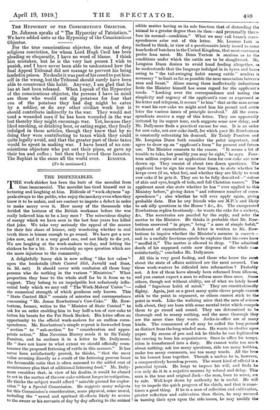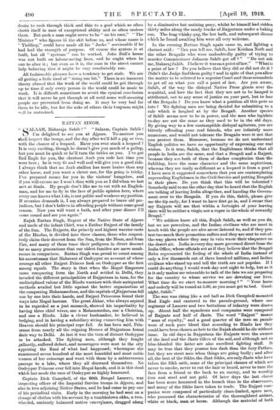THE DISPENSABLES.
THE work-shirker has been the butt of the moralist from time immemorial. The moralist has tired himself out in lecturing and laughing at him. Ridicule of "work-shyness "ap- peals always to the public, who enjoy the mockery even when they know it to be unfair, and are content to impute a defect in order to make merry over it. How many of the thousands who derided the laziness of the British workman before the war really believed him to be a lazy man The miraculous display of energy which we have seen in the last four years has killed that joke. We take very seriously the appeal of the masses for their fair share of leisure, only wondering whether in real truth there is leisure enough to go round. We have got a new joke now, and it is a very good one, and not likely to die yet. We are laughing at the work-makers to-day, and letting the shirkers be for a bit. It is certainly an open question which are the more injurious to the community.
A delightfully funny skit is now selling " like hot cakes upon the bookstall (State Control Skit, Jerrold and Sons, IS. M. net). It should cover with confusion all those busy persons who do nothing in the various " Ministries." What proportion they bear to the whole staff far be it from us to suggest. They belong to an impalpable but nefariously influ- ential body which we may call " The Work-Makers' Union"— the numerical strength of which goodness only knows. This " State Control Skit " consists of minutes and correspondence concerning " Mr. Jonas Rowbottom's Cow-Cake." Mr. Row- bottom, farmer, writes to the " Minister of State Control " to ask for an order enabling him to buy half-a-ton of cow-cake to fatten his beasts for the Fat Stock Market, His letter offers an opportunity to the official work-makers for an endless corre- spondence. Mr. Rowbottom's simple request is forwarded from " section " to " sub-section " for " consideration and appro- priate action." Miss Neverina Hurray sends it to Sir Tainly Passiton, and he encloses it in a letter to Mr. Dallymore. He " does not know to what extent we should officially coun- tenance the proposed fattening of cattle in this manner." It has never been satisfactorily proved, he thinks, " that the meat value accruing directly as a result of the fattening process bears the favourable ratio that is often assumed to the added cost of maintenance plus that of additional fattening food." Mr. Daily- more considers that, in view of his doubts, it would be absurd to act in the matter of the cow-cake without longer investigation. He thinks the subject would afford " suitable ground for explor- ation" by a Special Commission. He suggests many subjects for this Commission's consideration, some physical, some moral, including the " moral and spiritual ill-effects likely to accrue to the owner or his servants of day by day offering to the animal edible matter having as its sole function that of distending the animal to a greater degree than its then—and presumably then). fore its normal—condition." What we may call branch corre- spondences arise out of this letter. Mr. Learner Lott le inclined to think, in view of a questionnaire lately issued to some hundreds of butchers in the United Kingdom, that most customers prefer lean meat. Mr. Dono Turtem is anxious as to the conditions under which the cattle are to be slaughtered. Mr. Longsins Dunn desires to avoid hand feeding altogether, as he understands that the language indulged in in byres and barns owing to " the tail-swinging habit among cattle " renders it necessary " to limit as far as possible the near association between man and beast," Alone among these ineffectually industrious fools the Minister himself has some regard for the applicant's needs. " Looking over the correspondence and noting the simplicity and urgency of the applicant's case as expressed is his letter and telegram, it occurs " to him " that as the roan seems to want his cow-cake we might send him his permit and settle later the various issues of principle involved." All the corre- spondents receive a copy of this letter. They are apparently irritated by its urgent tone, each suggests some new delay, and Mr. Dallymore finds a practical excuse for one. It is an order for cow-cake, not cow-cake itself, for which poor Mr. Rowbottom is constantly reiterating his demand. Sir Tainly Passiton and Mr. Longsins Dunn both consider the point important, and agree to draw up an "applicant's form" for present and future use. The Minister consents to the course. " It seems a lot of trouble to take, but possibly you may be right," he says. Four- teen million copies of an application form for cow-cake are now drawn up. They consist of about two dozen questions. The applicant has to sign his name four times, to state whether hs keeps cows (if so, what for), and whether they are likely to want cow-cake if he gets it. They are to be fully described—" colour of skin and eyes, length of tails; and full Christian names." The applicant must also state whether he has " ever applied to tide Ministry before," giving dates " and reference number of corre- spondence " ; also whether he will ever apply again, giving probable date. Has he any friends who are M.P.'s and likely to ask silly questions in the House ? &c., &c. The exasperated Rowbottom replies facetiously—he wants the cake for a rockery, &c. The secretaries are puzzled by the reply, and refer the matter to the Minister. He thinks it probable that Mr. Row- bottom answered "in pique," being "a man of simple habit,,' intolerant of examination. A letter is written to Mr. Row- bottom to inquire whether the Minister's surmise is correct— and in a ruefully facetious epistle he explains that his cows have " snuffed it." The matter is allowed to drop. "The admitted death of his supposed cattle now disposes of the whole ease satisfactorily," concludes Mr. Dallymore.
All this is very good fooling, and those who know the most about the state of affairs satirized are the most amused. Can these work-wasters be ridiculed into reformation ? Probably not. A few of them have already been reformed from idleness, and you cannot expect a man to reform more than once. Some others, though not without ability, are of what we lately heard called " fugacious habit of mind." They are constitutionally flighty. Again, just as a great many quite clever people cannot stick to the point in argument, so others cannot stick to the point in work. Like the waltzing mice that the men of science talk about, they are born with some mental twist which compels them to go round and round. They arc determined to be thorough and to scamp nothing, and the more thorough they are the more time they waste. Jacks-in-office are of many kinds. The commonest of all may be called the long-penned as distinct from the long-winded man. He wants to chatter upon paper. By means of pen and ink he thinks he can legitimatize his craving to bore his acquaintance. Once in office his tempt. ation is transformed into a duty. He cannot write too much about nothing, ask too many questions, ride too many hobbies, make too many comments, use too many words. All the bees in his bonnet hum together. Though a useless he is, however, a comparatively barmiest person. The worst kind of official is • potential tyrant. He longs to impose his will, and finds he can only do it in a negative manner by refusal and delay. This man is the true and original Jack—the man, born to serve, set to rule. Well kept down by authority he is useful. He will try to impede the quick progress of his chiefs, and that is some- times a good thing. If he is a man of reflection and cultivation, greater reflection and cultivation than theirs, he may succeed in turning their eyes upon the side-issues, he may modify th•
desire to rush through thick and thin to a foal which 'so often shows itself in men of exceptional ability and so often 'undoes them. But such a man ought never to he " on his own." " The Minister" who figures id the skit before us, and whose name is " Yielding," could have made all his " Jacks " servieeable if he had had the strength of purpose. Of course the system is at fault, but all " systems " can be worked. John Bull's house was not built on labour-saving lines, and he ought when he can to alter it ; but even as it is, the man in the street cannot help believing that it might be very comfortably run.
All fashionable phrases have a tendency to get stale. We are all getting a little tired of " doing our bit." There is an innocent theory abroad that the work of the world could he sot through up to time if only every person in the world could lie made to work. It is difficult sometimes to avoid the cynical conclusion that it will never be got through at all until some well-meaning people are prevented from doing so. It may be very bad for them to be idle, but for the sake of others their busyness might well be restrained.



































 Previous page
Previous page